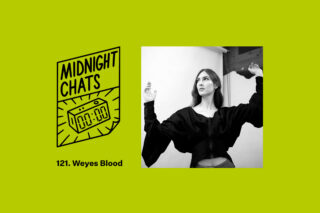Natalie Mering is fascinated by polarities. A former noise musician now famed for a velvety croon that could rival Karen Carpenter, the Californian singer-songwriter better known as Weyes Blood is responsible for some of the most wildly beautiful records of the last decade. Look beyond the plush vocal harmonies and sumptuous arrangements, however, and you’ll usually find a needling sense of unease, communicated in lyrics contemplating issues as dense as the climate crisis and social media-induced anxiety. In a strange piece of synergy, this morning she’s wearing jeans that work as a physical manifestation of that inner duality, with one black leg and one white.
Mering is in London to promote And In The Darkness, Hearts Aglow, her fifth studio album and the second part of a trilogy that she began with 2019’s universally adored Titanic Rising. She describes this new record as a “dystopian romance novel”, examining human connections, or the lack thereof. Sonically, the album was inspired by Scott Walker’s late ’60s output – specifically Scott 3 and Scott 4 – but predictably the results are much more complex. Extending from celestial soft-rock (‘It’s Not Just Me, It’s Everyone’) to Vangelis-esque soundscapes (the Daniel Lopatin-assisted ‘God Turn Me Into A Flower’), the record is rich with ambitious sonic tapestries, variously combining strings, harps, choirs, galactic synths and the hopeful chirrup of birds.
In a piece of particularly surreal timing, when we sit down to talk today – in the restaurant of a swanky East London hotel in mid-September – Queen Elizabeth II’s state funeral is being relayed live in the background. Already a slightly unsettling interviewee by virtue of her inscrutability, Mering’s low murmurs are given a weird gravitas by the sombre sounds of the Westminster Abbey Choir bleeding from a nearby TV. In some respects, it feels like the perfect first impression.

Gemma Samways: It’s definitely a strange time to be in the UK. What do you make of all the pageantry?
Natalie Mering: Well, I thought about going and looking at the coffin, but it was a 16-hour line so I didn’t do it. Do you know the documentary filmmaker Adam Curtis?
GS: Of course.
NM: So I was supposed to meet up with him later and he was like, “Oh yeah, it’s the Queen’s funeral but we could meet up.” And I was like, that is the biggest flex for me, an American, to be like, “During the Queen’s funeral I was just hanging with Adam Curtis.”
GS: Why are you hanging out with Adam Curtis?
NM: I’m just such a huge fan of his work. He came to one of my shows and we’ve just been, like, loosely in touch for some years now.
GS: I find his films such a mindfuck. The way he shows that the smallest actions in the past cause ripples in history that impact our daily reality…
NM: That’s what we talk about. Like, what happened in 1999? Why did culture just suddenly plummet into the ground? Because the boomers were afraid of death. We just jam. I’m just really into history. I think if I hadn’t been a songwriter, I probably would have been somebody like that who’s just constantly mining for clues.
But yeah, the funeral. As an American, we get so gaga about pageantry because we don’t have anything like that. So it’s easy to be fascinated by it. And also the British Empire was just so massive. She’s kind of the last big reigning monarch.
GS: Which feels a neat way to segue into your new album, And In The Darkness, Hearts Aglow, and the song ‘Children Of The Empire’.
NM: Yeah, I mean, it’s inspired by being an extension of the British Empire, for sure. Just the idea of an empire being an influential thing that changes and kind of flatlines the culture globally – you know, a lot of technology and things are all the same. But the empire could refer to children of the western empire, or anywhere.
GS: The album artwork feels very nostalgic.
NM: Like Blade Runner meets Pride and Prejudice. I wrote the song ‘Hearts Aglow’ and when I was thinking about the album artwork, I was like, well, you know, what I’ve never done is built a prosthetic. So I found somebody that could build a prosthetic, glow-in-the-dark chest plate. I just thought that would be so fun to take pictures of and make videos with. So we just went for it. And the dress was actually a Halloween costume that I just happened to put on for one of the shoots.
GS: What was the Halloween costume?
NM: Just a sexy, dead, 17th-century hottie. I was walking down the street and I just walked into a vintage shop and saw the dress and was like, “There’s my costume|.” But the album’s visual concept is definitely cohesive, and that artwork appears in some of the videos. But this video I’m about to put out for ‘It’s Not Just Me, It’s Everybody’ is kind of a different universe.
GS: A different universe in what sense?
NM: Have you ever seen [1945 film] Anchors Aweigh with Gene Kelly, where he dances with Jerry the Mouse? It’s loosely based on that dance, but with an animated cell phone. Like a Technicolor musical apocalypse stage thing.
GS: Were you a theatre kid growing up?
NM: Kind of. Not totally, but I was definitely into it. I played Rizzo in Grease twice: once in middle school and once in high school. But I’m a big fan of the Technicolor musicals, the MGM musicals. There’s very little plot, it doesn’t totally make sense: it’s just these huge visual displays with practical effects and lighting and things like that. So it’s fun to experiment with that. In this video I’m dressed like a sailor.
GS: I’m imagining On The Town.
NM: Totally like that.











